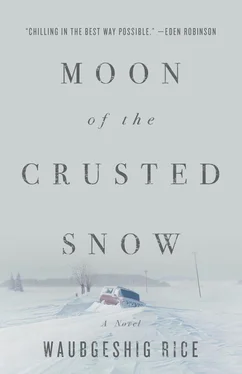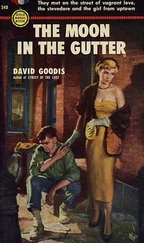“Alright, my boy, now do the little yellow ones,” said Nicole. He opened the right cupboard and inspected the rows of cans of corn. “Found them!” he proclaimed. He proceeded to count and declared that there were nine in there.
Nicole jotted down 9 next to whole corn in an elementary-school scribbler. When they finished in the kitchen and in the hall pantry, she planned to tally the contents of the bigger pantry in the basement. But she would wait until Evan arrived home to watch the kids so she could do it on her own. She wanted to keep the lights off in the basement for now and knew she’d be faster without her son later.
She planned on counting the upstairs stores once again anyway. Not that she didn’t trust her son’s skills. She just needed something else to do to pass the time.
Nicole had grown up in a house much like the one she shared with Evan and her children. She had two older sisters. Geraldine, the eldest, lived on the other side of the rez with her husband and three boys, and Danielle had moved to Toronto for school when she was nineteen and had been there ever since. Her husband, Sean, was not Native and was often teased by everyone in their wider family, but he was loved deeply nonetheless.
Nicole thought now of her seven-year-old nephew, Will, and what might have become of him since the rez had been cut off from the world. She pictured his toothless grin and bright blue eyes. She wondered if Toronto was blacked out too. She thought of the chaos she’d heard about in Gibson and pictured her young nephew frightened as hungry mobs rolled through the bigger city streets where he lived. Fear crept up her back and she shuddered. She shook the thought from her head and focused again on Maiingan.
“Okay, bud, how many little green ones? Those are the peas,” she said.
“Ewww, peas? I don’t want to count them!” Maiingan scrunched up his little face. “Peas are gross!”
Nicole snickered. “You don’t have to eat them. Just count them!”
“Okay,” the boy reluctantly agreed. “One… two… three…”
“One! Two! Three!” Nangohns echoed from the table. She raised her head from her colouring book, apparently in need of attention. Nicole’s heart warmed every time she heard her daughter’s voice. “Can you count too, baby girl?” she asked. The three-year-old nodded enthusiastically and looked back down to the erratic lines of blue and orange crayon that breached the outlines of the picture she was colouring in.
Nicole heard feet stomping up the stairs to the front door and turned to see Evan’s head loom into the window frame, his breath visible as he exhaled. He opened the door, and Maiingan shouted, “Daddy! I’ve been helping Mommy count the cans!”
“Daddy!” Nangohns echoed. Nicole helped the boy down from the counter as the girl leaped off her chair.
“Aaniin, binoojiinyag!” he boomed. They ran up and wrapped their arms around him, cold coat and all. He leaned down to kiss the tops of their heads while he tried to wiggle out of his coat with the children stuck to his legs.
“Hey,” Nicole said as he walked over to kiss her. They hugged, holding on tightly. “Ah, this feels solid. This feels safe,” she said into his shoulder.
“Huh?” he said.
“Oh, nothing. Just glad you’re home.”
It was unclear to them both if this was the shape of their lives now. Evan still held out hope that it was temporary, but Nicole was less certain.
Evan’s workload had increased substantially with the electricity rationing. He kicked off his boots and collapsed on the couch. It was well past noon and he had been up since before dawn, ploughing the roads and then driving Candace North around to continue inventorying people’s household food stores. It was their third day — an intense, tiring routine that involved taking a lot of questions and requests from the worried townspeople. “When’s this blackout gonna be over?” most asked. “We don’t have no more meat!” declared others. “You sure this food is gonna last?”
He was thankful that he didn’t have to answer the questions. He just had to go through refrigerators, cupboards, pantries, and deep freezers to register what people had so the council could determine what would be needed in the rollout of rations. He was disappointed to discover how few hunted anymore. Many had grown complacent in the rut of welfare.
As he lay on the couch, Evan thought about the remaining homes they had to get to. Images of pickup trucks, blowing snow, and counting cans and weighing moose meat whirled through his mind.
~
He was driving the plough through a thick layer of heavy snow on the road by the rink. The truck struggled as the road became tougher to navigate the closer he came to the heart of the community. The overcast daylight cast everything in a sickly grey glow.
He drove up to the main intersection. He looked to his right to see if anyone was at the rink, but he could see that the metal roof had caved in. Ahead of him, the snow was nearly as high as the truck’s headlights. The wheels spun but gradually caught some traction and he kept ploughing his way to the community complex with the band office, school, and health station.
No one was around. It looked like no other vehicles had passed these roads in a very long time. The ghostly silence unnerved him. He reached the driveway to the community complex and frantically pulled on the steering wheel to make the turn, but the truck got stuck at the bottom of the hill.
Desperate, he tried to open the door, but the deep snow blocked his exit. He bodychecked the door with his shoulder, but it barely budged. He shifted in his seat to face the door and raised his feet to try to kick it open with both legs. That didn’t work either. So he kicked at the window to smash it open. His feet passed through, and glass flew into the cab and out onto the snow, now as high as the window itself. Still, no snow fell from the sky above.
Evan climbed out headfirst, shards of glass tearing at his jacket and pants. He tried to stand on the snow, but fell up to his thigh with each step. He lay on his belly to crawl the rest of the way to the band office. With each pull, the thick snow crushed into his face. It went into his nose and mouth, and he struggled to breathe. He had to pause to come up for air. He looked behind him, and saw a trail of blood all the way to the truck, where only the blue roof was now visible. The air remained dry and still but the snow grew denser and seemed to rise from beneath him.
Suddenly, the top began to freeze, taking hold of his arms, legs, and torso. It thickened with each lunge forward. He kicked to free his legs and feet as ice scabbed over the snow. He was sinking into the lighter stuff below and he struggled to hold himself up on the crust, kicking and heaving himself forward with as much force as he could rally. He rolled over onto the ice, exhausted, and lay on his back for a moment to catch his breath before struggling to his feet. The crust was now thick enough to support his weight, so he ran towards the building in the distance. He looked behind to find the gaping hole he’d escaped from, but it had already disappeared. A trail of blood still followed him. He didn’t know where he was cut.
He fixed his eyes on the front door of the complex. It appeared to sink as the snow got higher. He was running out of time. He needed to get in at all costs. He gasped for air as he pumped his legs as hard as he could. The creeping snow was now nearly as high as the door handle. Just steps away, he jumped forth with his shoulder down and his head tucked into his chest. His body hurtled through the glass. He got up and pulled open the second set of doors and went through, locking them behind him. The snow piled through the broken glass and filled the space between the doors.
Читать дальше












